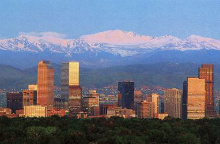The discussion that followed included many topics that are common to cities: at-risk kids, run-down housing, child hunger, drug and alcohol abuse, loneliness, and shut-ins that have no one to look in on them.
Then the mayor said something that inspired their desire to work better together as churches:
The majority of the issues that our community is facing would be eliminated or drastically reduced if we could just figure out a way to become a community of great neighbors.
Think about that for a moment. The mayor is talking to a group of pastors and suggests that what would help their community the most would be for people to learn to be good neighbors. If that were to happen, the elderly would be visited, at-risk kids would be mentored, loneliness would dissipate, and so on.
Maybe it has dawned on you that what he told them is what Jesus had told them:
"You shall love the Lord your God with all your heart and with all your soul and with all your mind. This is the great and first commandment. And a second is like it: You shall love your neighbor as yourself" (Matthew 22:37-39 esv).
Jesus has commanded us to be good neighbors. One day he told a story about this. A man was going down from Jerusalem to Jericho (Luke 10:25-37). He was literally going down as Jerusalem is 2,500 feet above sea level and Jericho is 700 feet below. But as he went down in altitude, so did his day. He was attacked by robbers who stripped him and beat him and left him half dead on the side of the road.
Jesus says a priest and a Levite - good upstanding church people - both passed by and did nothing. But then a Samaritan came along, saw the man, and had compassion on him. He took him to an inn where he left money with the innkeeper to take care of him.
Jesus then asked, "Which of these three, do you think, proved to be a neighbor to the man who fell among the robbers?"
The lawyer knew the answer: "The one who showed him mercy," he said.
Then Jesus told him to "go, and do likewise."
In this way, Jesus taught us what it means to truly love our neighbor.
The word "neighbor" has to do with "closeness" and "proximity." Your neighbors are your family, your church friends, and your next-door-neighbors. Your neighbor is also someone you might come across during your day that needs compassion. Know who they are. Not as the lawyer did - making a list so that you could justify not loving those who are not on the list - but rather in a practical way that makes obeying this command concrete.
As with many things in life, until we get specific we seldom see results. If we aim at being a neighbor to everyone we will likely end up being a neighbor to no one. So decide who you need to be a neighbor to.
In another meeting in Denver, the Arvada assistant city manager met with the group and told them:
From the city’s perspective, there isn’t a noticeable difference in how Christians and non-Christians neighbor in our community.
Quite a convicting statement. John reminds us that we cannot get by with saying we love God if we do not love our brother." The two go hand in hand (1 John 4:20).
This week, and the weeks that follow, be a good neighbor. Jesus commanded it. And even mayors recommend it.











Comments
Have thoughts on this article? Leave a comment